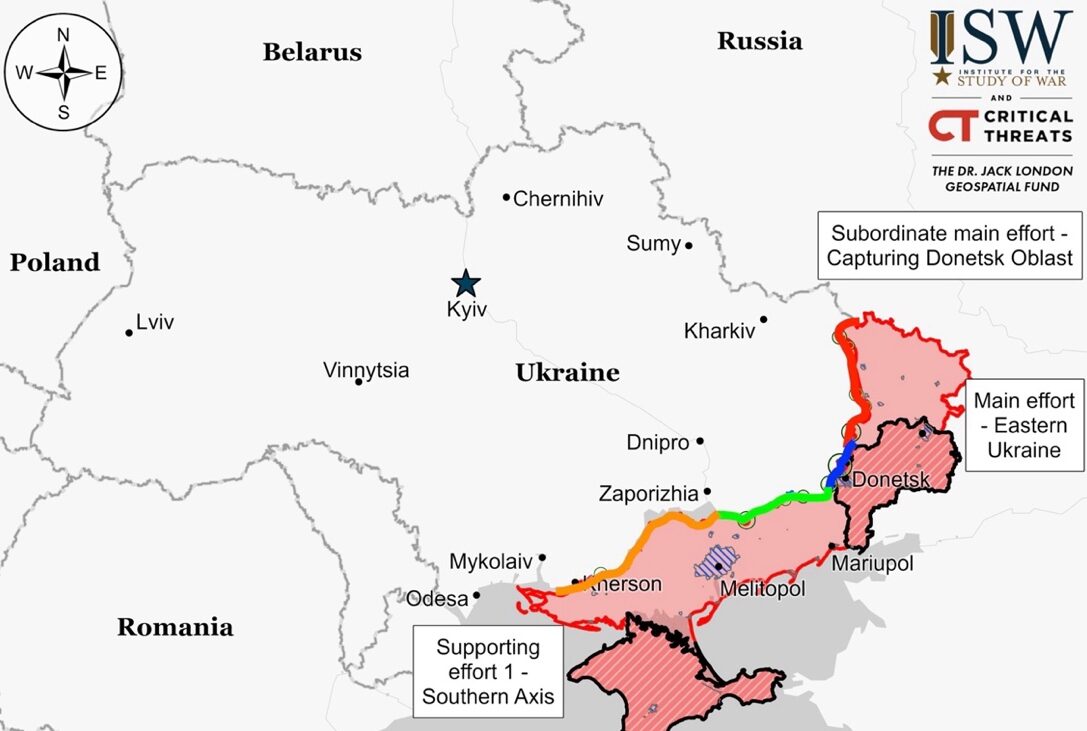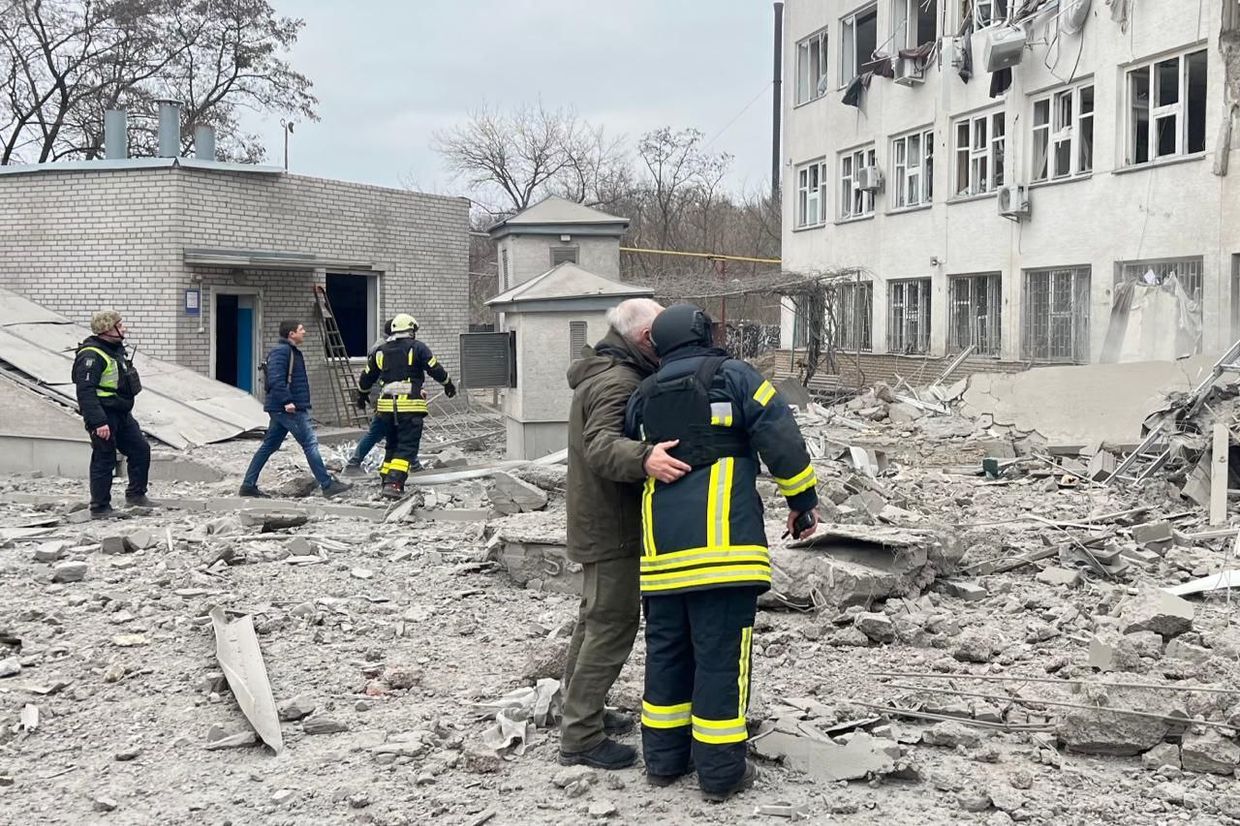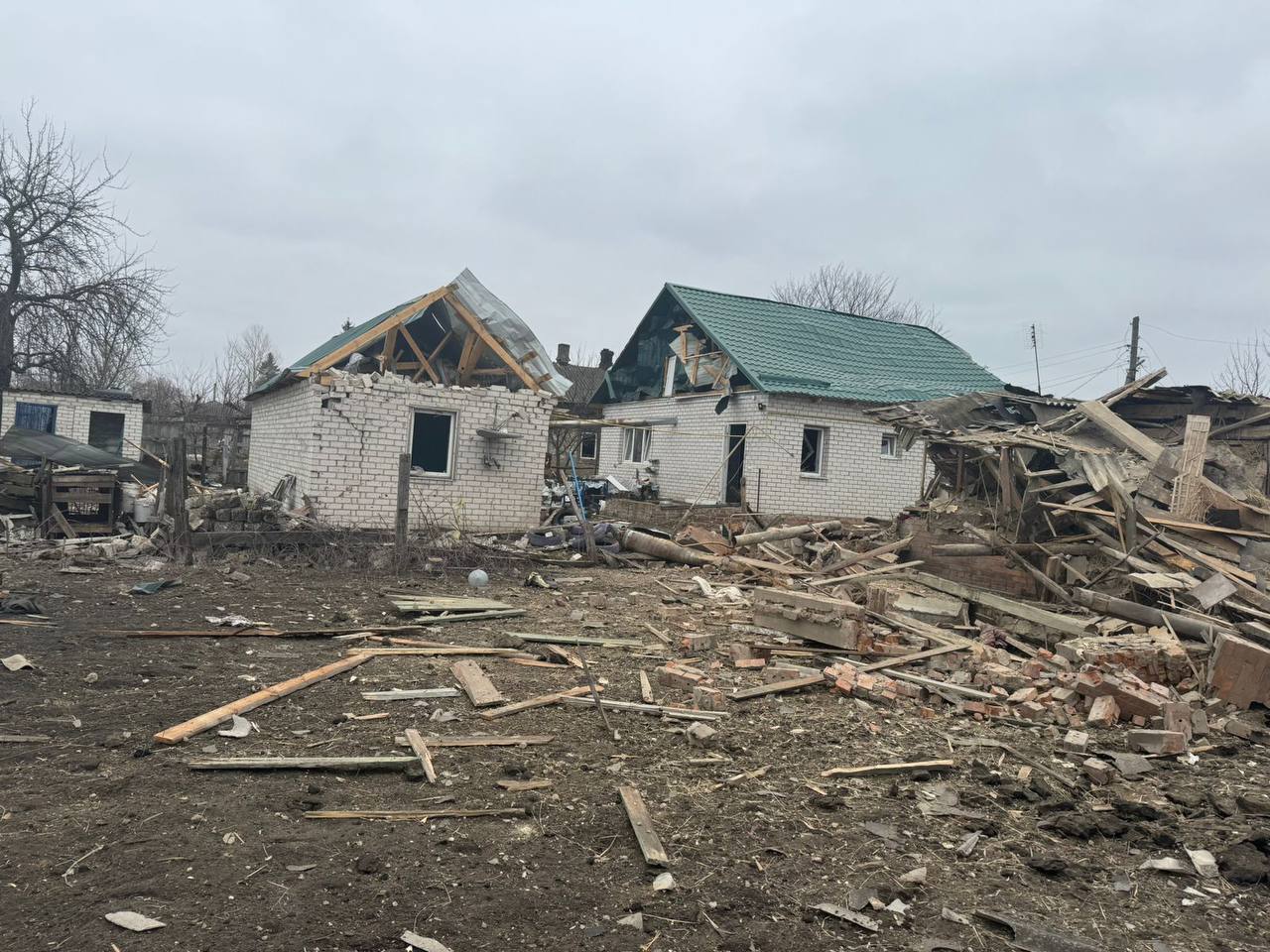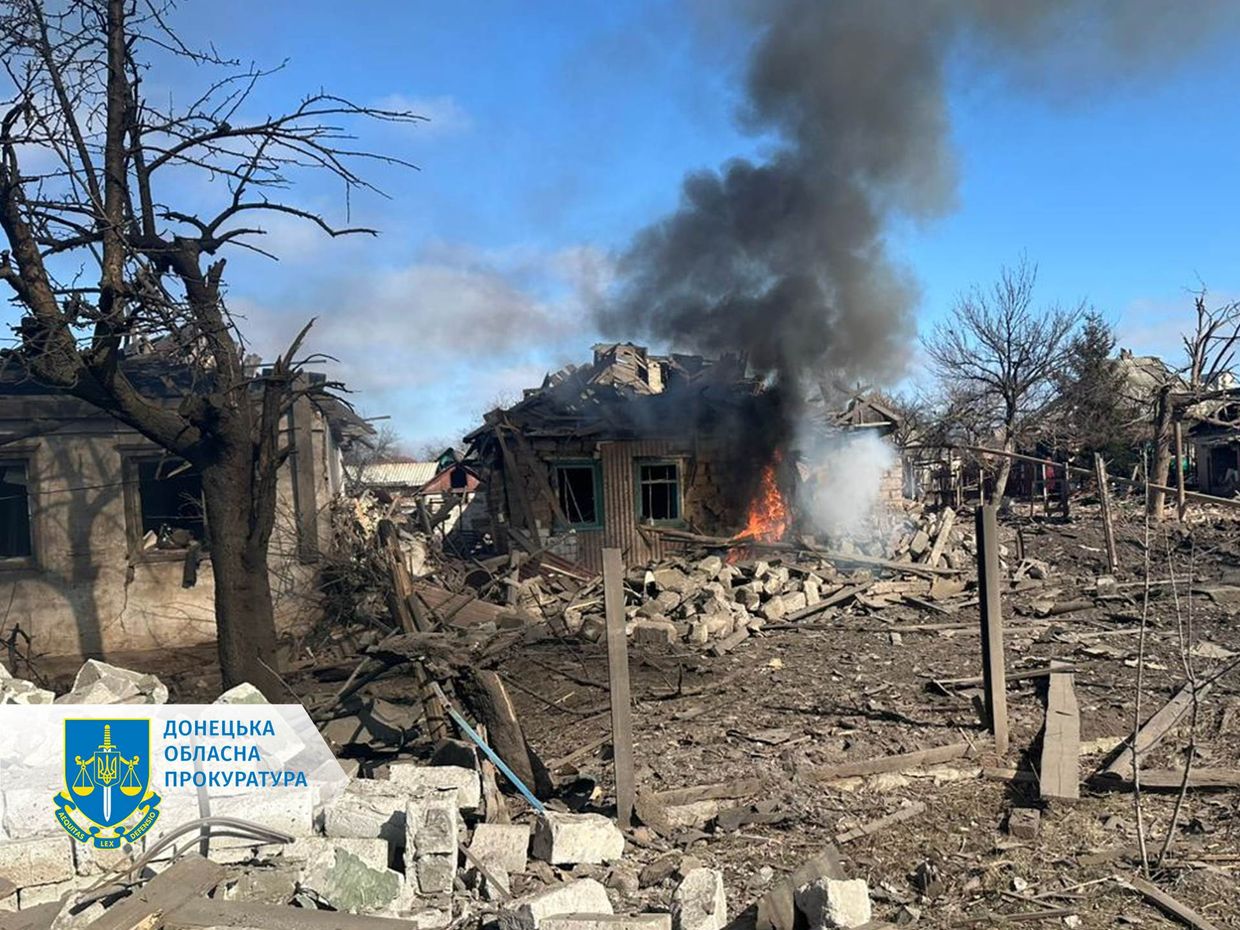Summary of the day: Lithuanian intelligence assessed that Russia could sustain its current pace in the Ukraine conflict and potentially expand its military capabilities while maintaining long-term objectives. Sweden’s formal entry into NATO as its 32nd member could shift dynamics in the alliance’s response to the conflict. Troop advancements by Russian forces near Kupyansk and Donetsk City were confirmed, indicating ongoing engagements along the contact line. Additionally, Chinese Foreign Minister Wang Yi reiterated calls for peace negotiations, although Russia may exploit such diplomacy for its own strategic gains.
What Can I Do To Help Ukraine? This is a question I receive all the time. We at Transform Ukraine are building longer-term housing for internally displaced Ukrainians. Visit Rebuild Ukraine for how you can assist in housing a Ukrainian family displaced by the war.
Situation On The Ground And Air
Ukrainian border guards repelled a Russian sabotage and reconnaissance group in Sumy Oblast overnight. The region shares a border with Russian oblasts and is frequently targeted by Russian forces. The guards detected and fired upon the enemy group, causing them to retreat. Casualties on the Russian side are being determined.

Luhansk Front – Initiative Russia
Donetsk Front – Initiative Russia
Zaporizhia Front – Initiative Russia
Kherson (Dnipro River) Front – Initiative Russia
Russian forces made slight advancements northeast of Kupyansk amidst ongoing positional fighting. Geolocated footage confirms this advancement in Synkivka’s northern outskirts. The fighting persists southeast of Kupyansk near Tabaivka, west of Kreminna near Terny and Yampolivka, and south of Kreminna near Bilohorivka.
Kharkiv Oblast Governor Oleh Syniehubov declared mandatory evacuation for residents near Kupiansk due to intensified attacks by Russian forces. Residents from 57 settlements will be relocated, with special focus on evacuating children from 18 settlements. The evacuation aims to protect civilians from Russian aggression. Russia’s concentration of forces near Kupiansk raises concerns, with warnings that delayed Western military aid could lead to larger-scale attacks, like those seen in Avdiivka.
Positional fighting persisted in the Bakhmut area. Ukrainian sources claimed advances near Bohdanivka, but visual confirmation is pending. Fighting also continued west, southwest, and south of Bakhmut.
Positional fighting continued in the Avdiivka area. Ukrainian forces reportedly counterattacked near Berdychi, but visual confirmation is pending. Fighting persisted northwest, west, and southwest of Avdiivka. Russian forces are focusing offensive operations around Tonenke, with various motorized rifle brigades reportedly active in the area.
Russian forces advanced west and southwest of Donetsk City amidst ongoing positional fighting. Geolocated footage confirmed Russian advancements in southern Heorhiivka and southwestern Novomykhailivka. Russian milbloggers claimed further advances, but visual confirmation is awaited. Ukrainian forces repelled mechanized assaults near Novomykhailivka, destroying 12 Russian armored vehicles. Fighting continued west of Donetsk City near Pobieda and Krasnohorivka. Various Russian motorized rifle divisions and brigades are reportedly active in the area.
Positional fighting took place near Vodyane in western Donetsk Oblast.
Positional engagements continued in western Zaporizhia Oblast without confirmed frontline changes. Fighting occurred near Robotyne and Verbove, although Russian claims of advancement lacked visual confirmation. Ukrainian sources noted increased use of all-terrain vehicles by Russian forces, especially over minefields. Various Russian motorized rifle regiments are reportedly active in the area.
Russian forces intensified activity in the Orikhiv direction in Zaporizhzhia Oblast, aiming to cut off the Robotyne salient. Robotyne, liberated by Ukraine in 2023, is strategically positioned on the route to occupied areas. There is a significant increase in Russian assaults, with 16 attacks in the past 24 hours. Despite the escalation, all assaults were repelled. This surge follows a similar increase in mid-February, reported by the Institute for the Study of War (ISW).
Positional engagements persisted in eastern Kherson Oblast near Krynky. Ukrainian forces reportedly held positions near the Antonivsky roadway bridge, according to Russian milbloggers.
Human Costs Of War
In the past 24 hours, Russian attacks on civilian targets resulted in the death of three people and injuries to around 17 others:
- Russian forces launched 32 attacks on Sumy Oblast, hitting 11 communities. Shelling injured a civilian in Sumy. A missile strike damaged key infrastructure including a school and hospital. The attacks caused over 233 explosions. Multiple weapons, including mortars and drones, were used.
- Nearly 10 people were injured, with four hospitalized, in a missile strike on Sumy. The attack damaged key infrastructure, including a hospital and school.
- A Russian airstrike in Vovchansk, Kharkiv Oblast killed a 40-year-old woman and injured a 67-year-old woman. The attack destroyed at least 12 homes and caused a contained fire.
- Russian forces launched a rocket attack on Kupiansk, resulting in the deaths of a man and a woman. The assault damaged multiple homes and caused a vehicle to catch fire.
- Russian rockets were fired upon Chuhuiv, Kharkiv Oblast, injuring a 17-year-old boy and a 37-year-old man. Damage includes a nine-story residential building, shops, a hotel, and around 13 cars.
- A Russian airstrike hit Toretsk in Donetsk Oblast, injuring three civilians. The attack damaged several houses and caused a fire. The wounded individuals, including two men aged 47 and 63, and a 63-year-old woman, received medical treatment.
 The aftermath of a Russian missile strike on Sumy
The aftermath of a Russian missile strike on Sumy
 The aftermath of a strike by a Russian guided aerial bomb on the city of Vovchansk
The aftermath of a strike by a Russian guided aerial bomb on the city of Vovchansk
 The aftermath of a Russian airstrike on Toretsk
The aftermath of a Russian airstrike on Toretsk
Ukraine News
Ukrainian forces shot down a Kh-59 missile over Poltava Oblast. Ukrainian officials reported Russian strikes on civilian infrastructure in Sumy City and a State Emergency Service training ground in Kharkiv Oblast. Additionally, a Kh-31P anti-radar missile launched by Russian forces toward Odesa Oblast malfunctioned before reaching its target.
President Volodymyr Zelensky approved Valerii Zaluzhnyi as the next Ukrainian ambassador to the U.K., announced by Ukraine’s Foreign Ministry. Zaluzhnyi, the former commander-in-chief, was dismissed in February. His appointment awaits finalization by the U.K. Zelensky appointed Oleksandr Syrskyi as the new chief commander. Zaluzhnyi’s dismissal stirred public debate, given his popularity for leading resistance against Russia. Zelensky thanked Zaluzhnyi for his service, noting he remains part of the team.
Ukrainian Mobilization and Defense Industrial Base
President Volodymyr Zelensky signed a decree to transfer some conscripts of compulsory basic military service to the reserve in spring 2024. This applies to those whose service terms were extended during martial law. Basic military service is compulsory in Ukraine for men aged 18-27, usually lasting at least a year. Martial law, in effect since Feb. 24, 2022, due to Russia’s invasion, has been repeatedly extended. The decree aims to address rotation issues on the front line. The transfer applies to soldiers across various military units and will take place in April-May 2024. Zelensky also signed a law on Feb. 26 facilitating the demobilization process, allowing conscripts to postpone further mobilization for 12 months.
Ukraine’s Allies
Sweden officially became the 32nd member of NATO, following a two-year process since its application. Swedish Prime Minister Ulf Kristersson handed over the membership documents to the U.S. Secretary of State Antony Blinken. NATO Secretary General Jens Stoltenberg welcomed Sweden, emphasizing the country’s strengthened security within the alliance. Sweden’s flag will be raised at NATO headquarters on March 11.
Lithuanian intelligence reports Russia’s capacity to sustain its Ukraine war efforts and expand military capabilities. They also anticipate Russia’s long-term objectives in Ukraine despite potential military setbacks. Furthermore, they suggest Russia is preparing for NATO confrontation while engaging in Ukraine. Recent Russian military discussions also hint at potential escalation beyond Ukraine.
Lithuania’s Ministry of Defense announced the transfer of 155-mm artillery shells to Ukraine. These shells are crucial for Ukraine’s military operations. Lithuania will also provide medical treatment, soldier training, and consultations. The country aims to train around 3,000 Ukrainian soldiers by 2024. Despite being a smaller contributor than the U.S., Lithuania’s aid relative to its GDP is among the highest globally. Lithuania pledged a 200-million-euro support package to Ukraine, covering military acquisitions and essentials like demining equipment and food rations.
Norway pledged 1.6 billion Norwegian kroner ($153 million) to buy artillery shells for Ukraine, addressing critical ammunition shortages. Czech-led efforts aim to secure 800,000 shells abroad, costing $1.5 billion. Allies like Canada, Belgium, and France are backing the initiative. Czech President Petr Pavel confirmed that the Czech-led initiative, with Norway’s recent contribution, has secured the funds needed to purchase 800,000 artillery shells for Ukraine.
The U.K. pledges 325 million pounds ($416 million) for over 10,000 drones for Ukraine, adding to a previous 200-million-pound ($256 million) package. Defense Secretary Grant Shapps made the announcement after meeting Ukrainian leaders. The aid includes FPV drones, attack drones, surveillance, and maritime drones. Over 100 million pounds ($128 million) will bolster Ukraine’s maritime capabilities. The move aims to enhance Ukraine’s defense against Russia and strengthen its drone operations, following President Zelensky’s decree to create a dedicated drone branch in February.
During the State of the Union address, President Biden urged Congress to stand firm against Vladimir Putin. He emphasized the urgency of bipartisan support for a national security bill to aid Ukraine, Israel, and Taiwan. The Senate passed a $95 billion foreign aid bill, but House Speaker Mike Johnson has delayed a vote. Biden stressed the importance of U.S. assistance for Ukraine’s defense against Russian aggression. He criticized delays in aid delivery and emphasized the need to prevent Putin from further aggression beyond Ukraine. Additionally, Biden criticized former President Trump’s accommodating stance towards Russia, reaffirming America’s commitment to NATO and global security.
U.S. Treasury Secretary Janet Yellen criticized the delay in U.S. aid for Ukraine, calling it a boon for Putin. The Senate passed a $61 billion aid bill for Ukraine on Feb. 13, but the House has not voted on it. Yellen urged the House to act swiftly to support Ukraine against Russian aggression. The delay in aid has led to ammunition shortages, impacting Ukraine’s ability to resist Russian advances. U.S. officials warn that this delay could significantly benefit Putin in the conflict.
Pro-Ukraine Republican Brian Fitzpatrick plans to gather signatures from March 8 to force a House vote on a $95 billion Ukraine aid bill. This “discharge petition” needs 218 signatures to bypass Speaker Mike Johnson’s block on the bill. Fitzpatrick aims to push aid to Ukraine despite Johnson’s resistance. While some Democrats oppose the move for lacking humanitarian aid, Fitzpatrick remains confident in gathering support. Discharge petitions are rarely successful but provide an alternative route to bring bills to vote.
Moldovan President Maia Sandu and French President Emmanuel Macron signed a bilateral defense deal in Paris, focusing on military training, intelligence sharing, and defense consultation. Amid escalating tensions with Russia, Sandu warned of potential aggression beyond Ukraine and called for European unity. Moldova’s intelligence agency highlighted Russian attempts to destabilize the country through political interference and potential manipulation of upcoming elections, including the EU accession referendum in 2024 and parliamentary elections in 2025.
U.S. Congressmen Raskin and Garcia are investigating SpaceX over Russia’s alleged use of Starlink terminals in Ukraine, citing concerns over security threats. They wrote to SpaceX’s president, Gwynne Shotwell, seeking clarification on the matter. Despite Musk’s denial of selling Starlink units to Russia, Ukrainian military intelligence claims Russia obtained them from “Arab countries.” The investigation is ongoing, with plans to involve the Pentagon and other agencies. SpaceX began providing Starlink terminals to Ukraine after Russia’s invasion in 2022 and won a contract with the Pentagon for satellite services in 2023.
Russia News
The Russian Foreign Ministry summoned U.S. Ambassador Lynne Tracy, warning against interference in Russia’s internal affairs ahead of its presidential election from March 15 to 17. Tracy attended Alexei Navalny’s funeral on March 1, a prominent Putin critic. Russia accused the U.S. Embassy of supporting NGOs conducting “anti-Russian programs” and threatened to expel employees spreading disinformation related to the election or the Ukraine conflict. This follows a similar summoning of the German ambassador and threats against German journalists.
Russian Mobilization and Defense Industrial Base
Russian intelligence services are likely still obtaining sanctioned precision machine tools and components to make military equipment, according to Lithuanian intelligence. They import these goods into Russia, sometimes through third-party intermediaries. Russian defense companies provide “shopping lists” to intelligence, seeking Western equipment despite sanctions. Recent reports show Russian companies using Japanese machinery to produce military vehicles, indicating efforts to circumvent sanctions.
Chechen Republic Head Ramzan Kadyrov stated that since February 2022, 38,529 Russian servicemen, including 16,430 Chechens, trained at the Russian Spetsnaz University in Gudermes. He also claimed that over 8,000 Chechen servicemen are currently fighting in Ukraine. Additionally, Kadyrov denied recent Western reports alleging Chechen units purchasing Ukrainian prisoners of war (POWs) on a “black market” for their own POW exchange, dismissing the claims as “fake news.”
Russia’s Allies
Chinese Foreign Minister Wang Yi reiterated calls for peace talks between Russia and Ukraine. Russia is expected to leverage these calls for its longstanding information operations, aiming for Western concessions. China, positioning itself as a neutral mediator, has previously expressed its desire to facilitate negotiations. Russian officials, emphasizing Russia’s role and security interests, are likely to engage with China’s calls for peace talks as part of their negotiation strategy.
Yevgenia Gutsul, governor of pro-Russian Gagauzia, met with Russian official Sergei Kiriyenko in Sochi, discussing Russian support and Moldova’s political situation. Gutsul asked for assistance with opening Russian bank accounts, lifting import embargoes, and negotiating gas prices with Gazprom. Moldovan authorities announced a criminal case against Gutsul for alleged illegal financing and voter bribery during her 2023 electoral campaign. The case follows Gutsul’s ties to the now-outlawed Shor Party led by pro-Kremlin figure Ilan Shor. Putin’s promise to support Gagauzia’s rights aligns with Kremlin’s focus on Moldovan regions amid EU accession negotiations and the upcoming presidential election.
Lithuanian intelligence noted increased Belarusian intelligence activities in Lithuania and heightened Russian military support to Belarus, boosting Belarusian military capabilities. Belarusian intelligence focuses on Lithuania due to its opposition movement and sizable Belarusian diaspora. Interrogations of travelers between Lithuania and Belarus are used to gather information and recruit agents. Russian deliveries of military equipment to Belarus, including Iskander-M ballistic missile systems and S-400 anti-aircraft missile systems, enhance Belarusian military potential and interoperability with Russian forces.
Russian Narratives and Propaganda
Russian President Vladimir Putin reiterated Russia’s denial of Ukrainian identity and sovereignty. He stated that the “spiritual reunification” of Russia and Ukraine will happen eventually, emphasizing the need to eradicate “disgusting manifestations of nationalism.” Putin’s remarks align with the Kremlin’s rhetoric rejecting Ukrainian national identity and sovereignty.
Senior Russian officials are portraying the West as an existential threat to Russia, aiming to justify Russia’s long-term war effort and deter Western military aid to Ukraine. Russian Security Council Secretary Nikolai Patrushev accused the West and NATO of preparing for direct military confrontations with Russia and sowing internal instability, particularly in the Northern Caucasus Federal Okrug. Additionally, the Russian Ministry of Foreign Affairs and State Duma Committee to Investigate Foreign Interference Chairperson Vitaly Piskarev accused US Ambassador to Russia Lynne Tracy of supporting entities hostile to Russia and interfering in the upcoming March 2024 Russian presidential election.
Source Materials
Institute for the Study of War – understandingwar.org
The Kyiv Independent – kyivindependent.com
Kyiv Post – kyivpost.com
